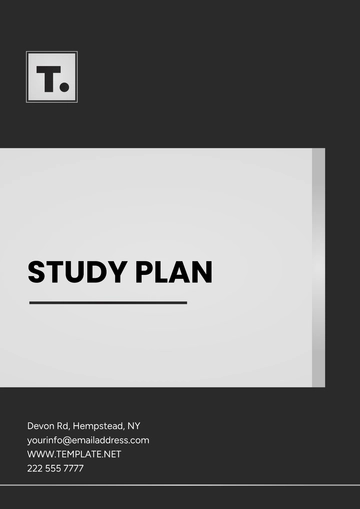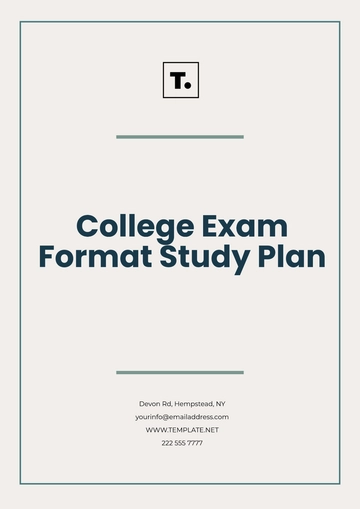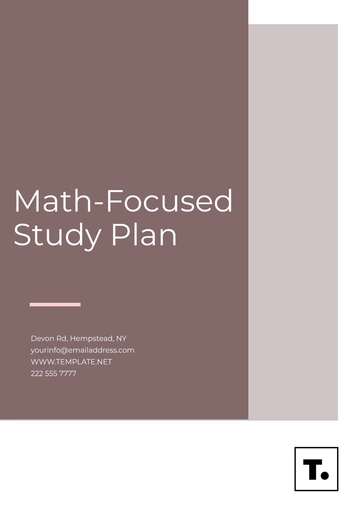Free Graduate Student Study Plan

I. Personal Information:
Name: [YOUR NAME]
Email: [YOUR EMAIL]
School: [YOUR COMPANY NAME]
II. Program Information
A. University Information:
University Name: [YOUR COMPANY NAME]
Department: [Your Department]
Program: [Your Program]
Specialization: [Your Specialization]
III. Study Goals and Objectives
Short-term Goals:
Gain a comprehensive understanding of [Your Field].
Complete all required coursework with a GPA of 3.8 or higher.
Long-term Goals:
Conduct significant research in the area of [Your Research Area]
Publish at least 10 papers in recognized journals.
Complete and defend my thesis by June 14, 2085.
IV. Study Schedule:
A. Coursework Plan:
Coursework Plan:
Semester 1:
[Course 1]: Introduction to Psychology
Description: This foundational course introduces students to the fundamental concepts, theories, and methodologies in psychology. Topics covered include psychological research methods, biopsychology, cognitive psychology, developmental psychology, and social psychology. Through lectures, readings, and practical exercises, students will gain a broad understanding of the principles underlying human behavior and mental processes.
Instructor: Dr. Amanda Roberts
Schedule: Mondays and Wednesdays, 9:00 AM - 10:30 AM
Location: Room 101
[Course 2]: Advanced Topics in Cognitive Neuroscience Seminar
Description: This seminar explores advanced topics in cognitive neuroscience, focusing on recent research findings and theoretical debates in the field. Topics covered may include neural mechanisms of perception, attention, memory, language, and decision-making. Through critical analysis of primary literature and student-led discussions, participants will deepen their understanding of the neural basis of cognition.
Instructor: Dr. Benjamin Hayes
Schedule: Tuesdays and Thursdays, 1:00 PM - 2:30 PM
Location: Room 203
Semester 2:
[Course 3]: Research Methods in Psychology
Description: This course provides comprehensive training in research methodologies commonly used in psychology. Topics covered include experimental design, survey methods, observational techniques, and data analysis using statistical software. Through hands-on projects and laboratory exercises, students will develop practical research skills essential for conducting empirical studies in psychology.
Instructor: Dr. Sarah Johnson
Schedule: Mondays and Wednesdays, 11:00 AM - 12:30 PM
Location: Room 305
[Course 4]: Special Topics in Clinical Psychology
Description: This course explores specialized topics within the field of clinical psychology, with a focus on current trends and emerging issues. Topics may include evidence-based interventions for specific psychological disorders, multicultural perspectives in therapy, ethical considerations in clinical practice, and innovations in assessment and diagnosis. Through readings, case studies, and guest lectures, students will deepen their understanding of contemporary issues in clinical psychology.
Instructor: Dr. Michael Thompson
Schedule: Fridays, 10:00 AM - 12:00 PM
Location: Room 207
Semester 3:
[Course 5]: Independent Study in Neuropsychology
Description: This independent study course provides an opportunity for students to conduct in-depth research on topics related to neuropsychology. Under the guidance of a faculty mentor, students will develop a research proposal, review relevant literature, collect and analyze data, and present their findings in a written report or oral presentation. Topics may include neural correlates of cognition, brain-behavior relationships, and clinical implications of brain damage.
Mentor: Dr. Elizabeth Carter
Schedule: Flexible, based on mentor availability
Location: Research Lab
[Course 6]: Elective Course: Psychology of Trauma
Description: This elective course examines the psychological impact of trauma on individuals and communities. Topics covered include the neurobiology of trauma, risk and resilience factors, trauma-informed interventions, and social justice issues related to trauma exposure. Through lectures, discussions, and case studies, students will gain insight into the complex nature of trauma and develop skills for supporting survivors and promoting healing.
Instructor: Dr. Jessica Rodriguez
Schedule: Wednesdays, 3:00 PM - 5:00 PM
Location: Room 310
B. Study Schedule:
Day | Time | Activity | Location |
|---|---|---|---|
Monday | 9:00 am - 12:00 pm | Attend Lectures [Course Name] | Classroom |
Monday | 1:00 pm - 3:00 pm | Study Session | Library/Location |
Tuesday | 10:00 am - 12:00 pm | Research Work | Lab/Location |
Tuesday | 2:00 pm - 4:00 pm | Group Study | Location |
Wednesday | 9:00 am - 11:00 am | Coursework [Course Name] | Classroom |
Wednesday | 1:00 pm - 3:00 pm | Advisor Meeting | Advisor's Office |
Thursday | 10:00 am - 12:00 pm | Research Work | Lab/Location |
Thursday | 2:00 pm - 4:00 pm | Study Session | Library/Location |
Friday | 9:00 am - 11:00 am | Coursework [Course Name] | Classroom |
Friday | 1:00 pm - 3:00 pm | Weekly Review & Planning | Personal Space |
V. Professional Development:
Attend [Conference Name] to present research findings and network with scholars in the field.
Participate in workshops on grant writing, academic publishing, and presentation skills.
Seek opportunities for internships or research assistantships to gain practical experience and build professional connections.
VI. Timeline and Milestones:
Fall Semester: Complete coursework and refine research topic.
Spring Semester: Conduct preliminary literature review and develop research proposal.
Summer: Collect data and begin data analysis.
Year 2: Complete data analysis, write thesis/dissertation, and defend research findings.
VII. Evaluation and Reflection:
Regularly assess progress towards academic and professional goals, seeking feedback from advisors and mentors. Reflect on challenges encountered and lessons learned, adjusting the study plan as needed to stay on track towards achieving desired outcomes.
- 100% Customizable, free editor
- Access 1 Million+ Templates, photo’s & graphics
- Download or share as a template
- Click and replace photos, graphics, text, backgrounds
- Resize, crop, AI write & more
- Access advanced editor
Unlock academic success with the Graduate Student Study Plan from Template.net. This meticulously crafted resource is your personalized roadmap to excellence. Fully editable and customizable, it harnesses the power of an AI Editable Tool to tailor your study journey. Empower yourself with structure and efficiency. Elevate your learning experience with this essential tool.





























